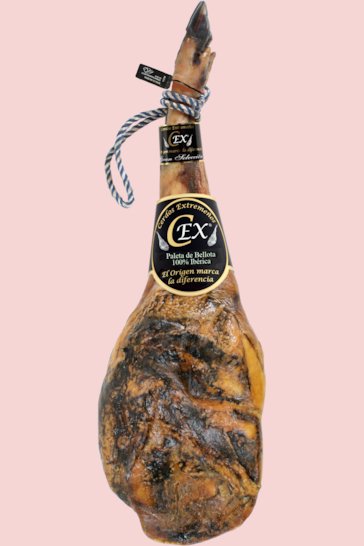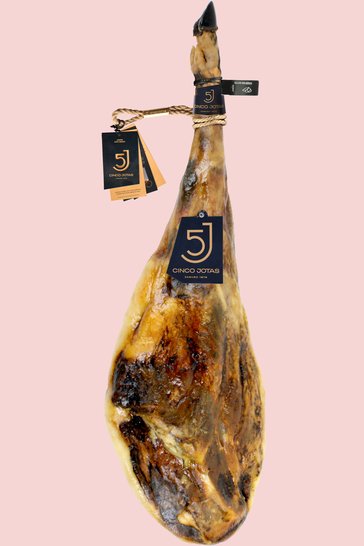Bone-in, Boneless & Sliced
Bone-in, Boneless & Sliced
The fat of "jamon iberico de bellota" contains over 55% oleic acid (a mono-unsaturated fatty acid). Rigorous scientific studies have shown that these fats exercise a beneficial effect on cholesterol in the blood by increasing the amount of good (HDL) cholesterol and reducing bad (LDL) cholesterol. Only virgin olive oil has a higher oleic acid content.
The total proportion of unsaturated fatty acids in cured Pata Negra jamones that have consumed a diet of acorns is over 75%, making it the most "cardiohealthy" of all animal fats, even healthier than some fats of plant origin. The breed of pigs is not the only explanation; their staple diet of acorns and grasses also plays an important role.
In addition to its beneficial effect on cholesterol, Iberico jamon provides proteins, vitamins B1, B6, B12 and folic acid, all highly beneficial for the nervous system and proper functioning of the brain. It is also rich in vitamin E, a powerful antioxidant, and in minerals such as copper, essential for bones and cartilage; calcium, iron, zinc, magnesium, phosphorus and finally, selenium, which has been attributed with antiaging properties.
With regard to calories, 100 grammes of Iberico bellota jamon provide less than 250 kcal (roughly the same as bread) meaning that, eaten in moderation, it can be included in low calorie diets.
It is also an excellent substitute for red meat: 100 grammes of jamon contain 43 grs. of protein.
Regarding salt, the WHO recommends a maximum daily salt intake of 5 grams (even less for children and adolescents) but the global average is twice this amount, lying somewhere between 8 and 11 grams.
Iberian jamon has the lowest salt content of all cured hams (between 2.5% and 4.5%), followed by Serrano ham (5%), Bayonne ham (5.5%) and Parma ham (5.7%). The secret lies in the genetic make-up of the Iberian pig, as its marbled fat and the higher pH levels of its meat prevent the salt from penetrating. When compared to other food products, it is on a par with Roquefort cheese or olives, for example.
Salt is a necessary ingredient in the production of jamon, as the meat would rot without it. It also acts as a flavour enhancer; a jamon with less than 2.5% salt content would taste insipid and even have an unpleasant texture on the palate.
IberGour offers an extensive selection of Spanish Jamon Iberico de Bellota including well-known brands such as Jamón Cinco Jotas.

